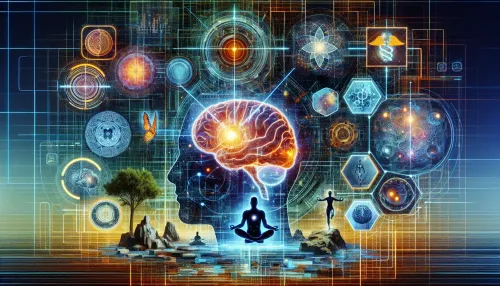Augmented Mental Well-Being: Exploring the Role of VR, AI, and Innovative Therapies

In today's fast-paced and technology-driven world, maintaining mental well-being is a common challenge for many. However, advancements in virtual reality (VR), artificial intelligence (AI), and innovative therapies have introduced groundbreaking solutions to address these concerns. Let's delve into the transformative potential of these technologies and therapies to enhance mental well-being.
Virtual Reality Therapy for Mental Health: Breakthroughs in Emotional Support Paradigms
Virtual reality therapy is revolutionizing the landscape of mental health treatment by providing immersive and interactive environments for therapeutic interventions. This innovative approach allows individuals to confront and manage their fears, phobias, and anxieties in a controlled and supportive setting.
Embracing Immersive Environments
VR therapy creates simulated scenarios that replicate real-life experiences, enabling individuals to engage with their emotions in a safe yet effective manner. By immersing themselves in these virtual worlds, individuals can gradually desensitize themselves to triggering stimuli while receiving guidance from mental health professionals.
Related Article: Holistic Healing Innovations: Advancements in Natural Therapies
Overcoming PTSD and Anxiety
For individuals grappling with post-traumatic stress disorder (PTSD) or debilitating anxiety disorders, VR therapy offers a constructive platform to address their emotional challenges. Through exposure therapy conducted in virtual environments, patients can confront distressing stimuli under the guidance of therapists, leading to symptom reduction and improved emotional resilience.
Integrating Mindfulness and Relaxation
Furthermore, VR technology facilitates the integration of mindfulness and relaxation techniques within its immersive experiences. By engaging in guided meditation sessions or tranquil virtual settings, individuals can alleviate stress, regulate their emotions, and foster a sense of inner peace, promoting overall mental well-being.
Related Article: Pursuing Professional Paths in Integrative Medicine: Fusing Traditional and Alternative Healing
AI-Powered Nutrition Guidance: Personalized Dietary Recommendations for Enhanced Well-Being
In the quest for holistic health, nutrition plays a pivotal role in influencing mental well-being. With AI-powered nutrition guidance, individuals can access personalized dietary recommendations tailored to their specific needs, fostering an optimized approach to mental well-being through proper nutrition.
Customized Dietary Analysis
AI algorithms analyze individual dietary habits, health parameters, and nutritional requirements to generate customized meal plans and dietary suggestions. By leveraging vast datasets and machine learning capabilities, AI can offer insightful recommendations to support mental health based on individual profiles.
Related Article: Plant-Based Medicine Revolution: Unraveling the Therapeutic Potential of Cannabinoids
Targeting Micronutrient Imbalances
AI excels in identifying micronutrient deficiencies that may affect mental well-being, empowering individuals to address potential nutritional gaps through targeted dietary adjustments or supplementation. From optimizing vitamin D levels to ensuring adequate intake of omega-3 fatty acids, AI-driven nutrition guidance enhances overall nutritional balance for optimal mental wellness.
Facilitating Behavioral Change
Moreover, AI-powered nutrition guidance complements traditional approaches by providing ongoing support and feedback. Through intuitive interfaces and personalized coaching modules, individuals can cultivate sustainable dietary habits that promote mental well-being while receiving continuous motivation and guidance.
Related Article: Unraveling the Power of Herbal Remedies: Integrating Nature's Healing Wisdom into Daily Life
Harnessing the Healing Potential of Psychedelic Therapy: A New Frontier in Mental Health Treatment
The resurgence of interest in psychedelic therapy has sparked compelling research into its potential as a transformative modality for addressing various mental health conditions. This novel approach involves the supervised administration of psychedelic substances in a therapeutic context, showing promise in treating conditions such as depression, PTSD, and addiction.
Facilitating Emotional Processing
Psychedelic therapy promotes profound emotional processing by inducing altered states of consciousness under professional supervision. These altered states allow individuals to explore deep-seated emotions, traumas, and existential concerns with heightened introspection, potentially leading to significant psychological breakthroughs.
Related Article: Transformative Potential of Psychedelic Therapy: Breakthroughs in Mental Health Treatment Paradigms
Fostered Neuroplasticity
Research suggests that psychedelic substances may facilitate neuroplasticity – the brain's ability to reorganize itself – thereby offering new perspectives on entrenched thought patterns and ingrained behaviors. This potential for cognitive restructuring holds implications for cultivating resilience and adaptive coping strategies in the context of mental well-being.
Ethical Considerations
However, it's paramount to navigate the ethical implications surrounding psychedelic therapy carefully. From patient safety and informed consent to regulatory frameworks ensuring responsible usage, ethical considerations form a crucial foundation for integrating psychedelic therapy into mainstream mental health practices while safeguarding individual well-being.
Related Article: The Healing Art of Sound Therapy: Harnessing Vibrational Frequencies for Holistic Wellness
Ethical Implications of Mental Health Tech Integration: Safeguarding Well-Being in Innovation
As technology continues to intersect with mental health care delivery, addressing ethical considerations becomes imperative to uphold individual well-being amidst innovation's rapid evolution.
Privacy Safeguards
The integration of AI-powered platforms and VR therapy necessitates robust privacy measures to protect sensitive personal data from unauthorized access or misuse. Ensuring stringent data encryption standards and transparent data handling practices forms a cornerstone of upholding individual privacy rights within these technological interventions.
Related Article: The Power of Hydrotherapy: Transformative Benefits for Physical Rehabilitation & Relaxation
Informed Consent Protocols
When deploying innovative therapies like VR or psychedelic treatments, informed consent protocols remain paramount. Individuals engaging with these interventions should receive comprehensive information regarding the nature of the therapies, potential risks and benefits involved – empowering them to make informed decisions aligned with their well-being.
Professional Oversight
Furthermore, professional oversight is instrumental in regulating the ethical implementation of advanced technologies within mental health care. By upholding industry standards and ethical codes of conduct, healthcare providers can integrate technological innovations responsibly while prioritizing patient safety and ethical practice standards.
In conclusion, by embracing cutting-edge technologies like VR therapy alongside AI-powered nutrition guidance while remaining vigilant about the ethical implications surrounding these innovations, individuals can embark on a transformative journey toward augmented mental well-being. As we navigate this dynamic landscape where innovation converges with mental health care delivery, Peppino Blog aims to empower our audience with actionable insights that foster holistic wellness in the digital age.
Frequently Asked Questions
Virtual reality therapy uses immersive environments to help individuals confront fears, phobias, and anxieties in a controlled setting. By simulating real-life scenarios, it allows patients to engage with their emotions safely, leading to symptom reduction and improved emotional resilience under professional guidance.
AI-powered nutrition guidance analyzes individual dietary habits to create personalized meal plans that support mental health. By identifying micronutrient deficiencies and providing tailored recommendations, it helps individuals optimize their nutritional intake, fostering better overall mental well-being through proper diet.
Professional oversight is crucial for ensuring the ethical implementation of technologies like VR and psychedelic therapies in mental health care. It helps maintain industry standards, safeguards patient safety, and ensures that innovative treatments are delivered responsibly while prioritizing ethical practices.
Check Out These Related Articles

Career Development in Mind-Body Wellness: Fostering Mental and Physical Harmony

The Revolutionary Potential of Psychedelic Therapy: Transformative Insights and Promising Results

The Rise of Psychedelic Therapy: Exploring Novel Mental Health Pathways
